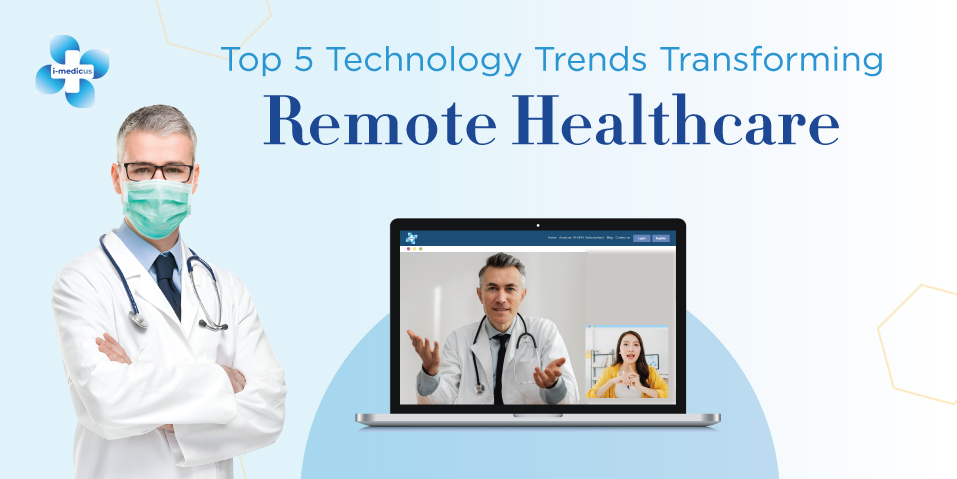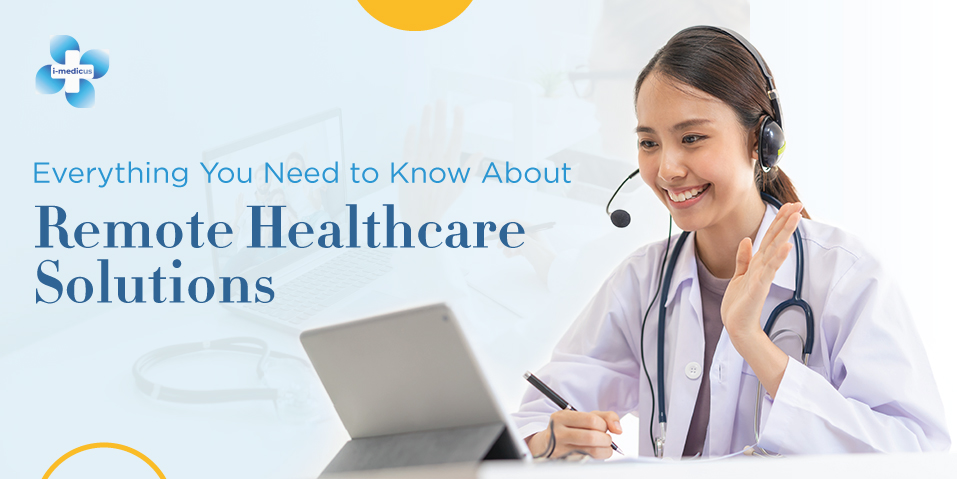It is simply remarkable to see how technology and societal norms have evolved over the past decade (especially during and after the COVID-19 pandemic). For example, a few years ago, the idea of remote virtual consultations seemed far-fetched to many. But today, telehealth is not simply booming but also reshaping healthcare technology trends as we know it.
As the French poet and novelist Victor Hugo said, “Nothing is more powerful than an idea whose time has come.”
The time for remote healthcare has truly arrived, thanks in large part to the technology trends that are shaping this transformation and thrust toward remote healthcare. What are these technology trends in remote healthcare and what makes them so promising? Find out answers to all these and more in this blog.
1. Artificial Intelligence (AI)
AI is a buzzword these days, and everybody seems to have an opinion on this healthcare technology trend. But it is important to remember that AI is a tool to aid healthcare professionals, not to replace them.
AI will supercharge remote healthcare by:
- Spotting problems early: AI analyzes data from wearables to predict health issues and enable early intervention.
- Boosting diagnosis: AI helps doctors remotely diagnose illnesses by analyzing medical images with high accuracy.
- Providing 24/7 support: AI-powered assistants answer questions, offer reminders, and empower patients.
- Smoothing telemedicine: AI schedules appointments, translates languages, and takes notes during consultations.
2. Metaverse
Telemedicine applications went from a way-out-there idea to something we use all the time! But what’s next? The metaverse, a super cool virtual world, could change how we get healthcare remotely.
Forget grainy video calls- the future of telehealth is immersive. Imagine stepping into a virtual doctor’s office with a headset. You’d see your doctor’s avatar, and even pick up on their body language, just like a real visit. This could make appointments feel more relaxed and helpful, especially for people who get nervous.
The metaverse isn’t just about fancy offices though. Doctors could use special glasses (AR) to see things like your X-rays right in front of them. The metaverse could even change how we recover.
“Metaverse will make remote healthcare even better, with more connection, teamwork, and even better results. ”
Imagine a virtual physical therapist guiding you through exercises in a fun video game setting, all from your own home. Or someone scared of heights conquering their fear by climbing a virtual mountain with a therapist – all in a safe, controlled space. Without a doubt one of the most exciting healthcare technology trends in 2024.
3. Blockchain
Security and data control are still concerns for electronic medical records in remote healthcare. But blockchain, a super secure record-keeping system could be a game-changer.
Patient medical records are stored securely in a digital vault, accessible only by the patient and authorized healthcare providers. No more worrying about breaches or lost paperwork. Blockchain could also streamline insurance claims and payments, making the whole process smoother for everyone.
Here’s another cool thing about this distributed ledger-based based healthcare technology trend: with secure data sharing, specialists from anywhere worldwide can easily access medical history to provide remote consultations. This is especially helpful for people in remote areas who are using online telehealth services. They might need access to certain specialists not available nearby.
4. Internet of Things (IoT)
Wouldn’t it be amazing if patients could be monitored at home? That’s where the Internet of Things (IoT) comes in – it’s a network of smart devices that can transform remote healthcare.
Wearables and sensors track patient vitals – heart rate, blood pressure, even sleep – sending the data securely to the doctor. This constant data stream unlocks superpowers for doctors.
They can spot issues early, like catching a potential blood sugar spike and calling to adjust meds. IoT devices can track medication use, send reminders, and even connect to smart pill dispensers.
The coolest part? By catching health concerns early, IoT can prevent nasty complications and hospital stays. It’s remote healthcare that feels personal, and proactive, and lets patients take the reins of their health journey. Faster recovery, lower costs – everyone wins!
5. Interactive Voice Assistants
Online telehealth services and consultations are awesome, but sometimes a quick answer is all you need. Here’s where interactive voice assistants (VAs) come in – think Alexa or Siri.
Feeling unwell? Just ask your VA, “Hey, what’s up with this cough?” The VA, with a secure medical database on hand, can offer info on common causes and even suggest home remedies.
Feeling under the weather and unsure if it’s a telehealth visit or a trip to urgent care? The VA can assess symptoms and guide you toward the right care.
VAs are like having friendly (and smart!) health assistants on call 24/7. They can’t replace a doctor, but they empower patients confidently to manage their health and navigate remote care. It’s a future where information and support are just a voice command away.
i-medicus and Remote Healthcare
i-medicus offers telehealth solutions for patients and providers. Our solutions are designed to make remote health care convenient and affordable. Here’s a breakdown of the key features offered by the i-medicus telehealth app:
- Login – Hassle-free sign-in process for easy access.
- Central Dashboard – Simplified control center providing an all-in-one view.
- Queue Management – Effortless queue handling ensures smooth patient flow.
- Organized Appointments – Structured booking system for simple scheduling.
- Flexible Schedule Slots – Customizable availability with adaptable time options.
- Patient List – Comprehensive user database offering detailed client records.
- Video/Audio Calling – Integrated call feature enabling seamless communication.
- Earnings Overview – Snapshot of revenue providing an income summary.
- Payment Records – Detailed transaction history and financial logs.
- Call History – Log of recorded interactions and communication.
The best part- you don’t have to spend on additional hardware or equipment costs. Simply download the app on your phone or any other device and you are all set to start.
Wrapping Up!
These technology trends in remote healthcare paint a picture where the future of care is more connected, personalized, and empowering for both patients and providers. It’s a future where information and support are a voice command away, early intervention is the norm, and specialists are accessible regardless of location.
The time for remote healthcare solutions has truly arrived. The future of remote healthcare is bright, interactive, and brimming with exciting possibilities. If you want to explore more about these healthcare technology trends, we are happy to answer all your questions. Feel free to contact our team and learn more about how you can integrate these trends into your practice.
FAQs
1. Does i-medicus come with AI features?
Yes, we’re planning to introduce AI and metaverse features soon to our telehealth platform. It’s all about making remote healthcare even better using the best healthcare technology trends.
2. Can blockchain integrate with my existing systems such as EMR?
Yes, blockchain technology can be integrated with existing systems such as EMR (Electronic Medical Records). Unlike traditional database architecture, Blockchain uses a decentralized approach, making it harder for anyone to tamper with the data.
3. How accurate are AI predictions and diagnoses in healthcare?
AI predictions and diagnoses in healthcare can be quite accurate, but it depends on factors like the quality of data and the specific task. While AI can match or exceed human accuracy in some cases, this healthcare technology trend is still meant to assist rather than replace healthcare professionals.
4. Is i-medicus HIPAA compliant?
Yes, our telehealth app is fully HIPAA compliant. Other than these, we also ensure that our app meets other compliances such as GDPR, NABIDH, ABDM, etc.
5. Does i-medicus offer trial access?
Currently, we don’t provide trial services. However, you can schedule a complimentary demo to witness the app’s functionalities first-hand. An expert will guide you through key features, and setup procedures, and resolve any questions you may have wrt remote healthcare in UAE, the USA, Europe, or any other region in particular.



